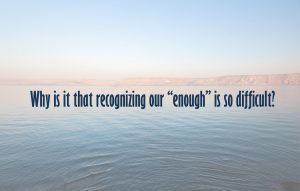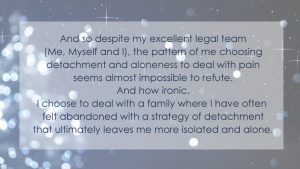transcending anxiety part 2
In my previous post, I explored a way of approaching anxiety based on Paul’s words in his letter to the Philippians. You can find a link to that post here. In this entry I want to return to Philippians 4 and build on that approach.
Do not be anxious about anything, but in every situation, by prayer and petition, with thanksgiving, present your requests to God. And the peace of God, which transcends all understanding, will guard your hearts and your minds in Christ Jesus.” (Philippians 4:6-7)
Paul shows us that there is nothing worth our anxious ruminations. Mind you, this is not the same as stating we will never experience anxiety, or we can stop all anxious thoughts from intruding. He’s telling us not to be anxious for anything, keyword be. We always get to choose how to respond when anxious thoughts are bubbling up in us. Paul reminds us that we should move toward communion with God through prayer, because in prayer we reclaim our rightful state as creatures, no longer seeking a vantage point of the gods. Prayer is where I choose how I want to respond, and prayer is where I begin again to follow Christ. This is not only spiritually right, it is effective in treating anxiety. Cognitive behavioral research shows us that acceptance and commitment is a proven way to move through and diminish symptoms of anxiety.
The next verses continue and complete the movement that Paul describes:
Finally, brothers and sisters, whatever is true, whatever is noble, whatever is right, whatever is pure, whatever is lovely, whatever is admirable—if anything is excellent or praiseworthy—think about such things. Whatever you have learned or received or heard from me, or seen in me—put it into practice. And the God of peace will be with you. (Philippians 4:8-9)
In a popular branch of cognitive behavioral therapy called “acceptance and commitment therapy” the client is asked to accept the anxious thoughts, not to push them away but also not to willingly ruminate on them. Instead, one is to realign with their greatest values, commitments, and purpose. Here Paul gives us a wonderful list of values, commitments, and purposes that are trustworthy. If you simply focus on trying to stop thinking anxious thoughts, or falling into the sticky trap of proving them not to be true ( or striving to make sure they won’t ever be true), you enter into an agreement with anxiety. The agreement is that this information that my brain is presenting is significant and needs to somehow be resolved before I can move on with my life. If you have experienced anxiety, you know the fruitlessness of this strategy.
If I choose to move toward God in prayer, resubmitting myself to the human condition that does not afford certainty, and embrace the freedom of being a beloved creature of God with limited power and knowledge, then I am freed up to move into my day in the precise way that I would like to. While this is freeing for anyone, it is especially good news for those of us that believe Jesus is Lord over all things and in all things.
However, this work is not easy and, in some circumstances, feels overwhelming, even dangerous (when experiencing phobias especially). Anxiety feels very convincing, playing on the parts of our nervous system that are meant to sound the alarm when we are actually in danger. This is why it is so helpful to have this cheat sheet from Paul. When I realize that I am struggling with anxiety, and not a real life issue, I have this list of values and commitments that I can lean into that don’t require me to feel good…at least not yet.
Depending on your translation, you may think that Paul is simply asking you to think different thoughts in place of the anxious thoughts. But a reasonable translation here would read that we would reckon with, consider, and finally decide on moving toward what is pure, lovely, praiseworthy, etc. This is not a tug-of-war of the mind, but a setting of the will toward how you want to invest your energy for the day.
One common way this shows up for people is when they get a text or email that states “we need to talk.” For many, the mind starts racing toward possible mistakes: have I offended them, did I drop the ball, are people talking about me? The mind races and finds no solid ground. But if we followed Paul’s lead here, we would begin by recognizing we are choosing anxious activity. And once I’m aware that I’m anxious, I now get to choose to move toward God. I don’t know what’s going to happen, I don’t know what is going to be said, I don’t know what kind of consequences I might face. But I can choose how I want to have the conversation, and align with why I’m choosing to prepare my heart to be true and loving—no matter what comes.
One slippery trap we fall into is to worry about whether or not this will “work.” This is another sneaky anxious thought. The relief that comes from this movement is that I don’t have to worry about whether it works, I’m moving toward it because it’s what I want to move toward, what I believe is right. I place my focus on how I want to be, instead of what might be.
 Prior to coming to The Barnabas Center in Charlotte in 2018, Kyle worked with families, couples, and individuals at a church in Daytona Beach, FL, for ten years. Kyle received his M.A. in Counseling from Reformed Theological Seminary in Orlando, FL, and has been counseling in the church and in private practice since then.
Prior to coming to The Barnabas Center in Charlotte in 2018, Kyle worked with families, couples, and individuals at a church in Daytona Beach, FL, for ten years. Kyle received his M.A. in Counseling from Reformed Theological Seminary in Orlando, FL, and has been counseling in the church and in private practice since then.
Kyle has been married to Carlyn since 2005 and they have two daughters. When not in the office or hanging out with his family, he likes to fly fish, spin records, and mind-run The Amazing Race (via TV and couch) with his wife.







